Derek Thompson's Blog, page 4
May 29, 2018
What I Did on My Bank Holiday
 This is no time for gardening!
This is no time for gardening!Most of the freelancers I know have an untraditional attitude to holidays. It's either a case of 'if I don't work I don't eat' or that clients don't expect you to be available so you can use the time to catch up on other stuff behind the scenes.
In my case that meant some morning yoga (don't be too impressed - we're only talking a few daily minutes here), a five-mile walk, and an unplanned meeting with a centenarian. He didn't say a lot but he was surprisingly spritely. He lives on a strict vegetarian diet and mostly sleeps in the wintertime. Okay, he's a tortoise. Apparently he was bought from Woolworth's in the 1920s.
After I'd got back and put aloe vera on my head (note to self: always take a hat with you; you can no longer remain in denial), I spent a little time reviewing my shiny website, beautifully reconstructed by Beth from https://lollipopsandrainbows.co.uk
Along with flitting in and out of http://www.professional-writer.co.uk I also sifted through old blog posts to see which ones deserved to make the cut. It's interesting to read the early material and to see how much character I put into those posts. Back then, I think, I wanted the reader to know me and to empathise with / be amused by my situations. As the calendar rolled on a few years I can see more book postings - mine and other people's - and a few sponsored posts that paid for meals out and other treats.
I wonder what I'd say to that writer who, back then, was still writing novels and stories in the abyss where readers fear to tread. Obviously, if he hadn't kept plugging away I'd be stuffed now and my book shelf would be a little more spacier. Maybe I'd tell him to write more - more material, more depth and more honesty. But here's the thing. Writers have a whole internal process of which readers - and often the writers themselves - are completely unaware. As a mental health professional recently said to me in a conversation about dream symbolism: it's all about the self. So every character, every murder or treachery or triumph or failure, comes from somewhere inside us. We may mine your names, situations and snippets of dialogue but the heart and soul of whatever we're writing is torn from us like pulsing flesh. We can only write what we're ready to write, at least if we want the words to emerge authentically. That means writing the crud as well as the gems. It means revealing some small part of oneself (and often not so mall) in every scene.
I'm joining a webchat later this week with a group of readers who have just read Standpoint, my first Thomas Bladen spy thriller. I don't know how other authors do it but I plan to answer every question head on, ducking nothing, in an effort to be as honest with my readers off the page as on it. They've chosen to journey through the world of my imagination so it's the least I can do. If I can I'll post some of the questions and answers in a blog next month.

Take a look at my books!
https://www.amazon.co.uk/Derek-Thompson/e/B0034ORY08
Published on May 29, 2018 02:02
March 6, 2018
Top Reasons to Harvest Your Rainwater
A sponsored post on behalf of Freeflush.

Top Reasons to Harvest Your Rainwater
RAINWATER IS FREE, BUT THE SUPPLY IS NOT DEPENDABLE!It rains a lot in the UK. Despite significant regional and seasonal variations there’s an average of 800 mm per year in the east / southeast and typically more than twice that in western parts of the UK. (Averaged over a 30-year period.) Source: Those lovely people at the Met Office.
IT”S GREEN (NOT LITERALLY!) AND GOOD FOR YOUR GARDEN.Rainwater is naturally softer than tap water and hasn’t been treated with chlorine. You could say it’s what Nature intended!
WHY PAY FOR SOMETHING WHEN YOU DON’T HAVE TO?Once your rainwater harvesting system is in place, it’s like someone’s putting money into your pocket every time it rains, in perpetuity. Save mains water usage and you save money – it’s as simple as that. A nifty rainwater harvesting calculator.
SMART GARDENINGIf your garden is lower than your house (and your rainwater storage container), you can emulate the Romans and have a gravity fed system that drought-proofs your lawn. Put a water butt anywhere in the garden and connect it with a permanent hose. As long as there’s no air in the system, it refills itself. No more unreeling / reeling to water the garden – think of the time you’ll save and all the other garden jobs you can do instead (sorry about that!).
ECO CREDENTIALS ARE GOOD FOR YOUR BUSINESS PROFILE Increasingly, it’s not just about your product or service; it’s about your company’s values as well. Whether or not your business has an environmental component, rainwater harvesting demonstrates your commitment to sustainability and conserving resources. Wearing kaftans and chanting are optional!
CONTINGENCY PLANNINGUnfortunately, mains water supply leaks and disruptions happen, affecting residential and business customers. Harvesting water can ensure you’re never caught short again! Rainwater can be used to flush toilets, can be filtered for drinking, and you can even wash the car for free with it. Not all with the same water though – that would just be wrong.
Freeflush design and supply rainwater harvesting systems, helping businesses and consumers save water and the environment.

Top Reasons to Harvest Your Rainwater
RAINWATER IS FREE, BUT THE SUPPLY IS NOT DEPENDABLE!It rains a lot in the UK. Despite significant regional and seasonal variations there’s an average of 800 mm per year in the east / southeast and typically more than twice that in western parts of the UK. (Averaged over a 30-year period.) Source: Those lovely people at the Met Office.
IT”S GREEN (NOT LITERALLY!) AND GOOD FOR YOUR GARDEN.Rainwater is naturally softer than tap water and hasn’t been treated with chlorine. You could say it’s what Nature intended!
WHY PAY FOR SOMETHING WHEN YOU DON’T HAVE TO?Once your rainwater harvesting system is in place, it’s like someone’s putting money into your pocket every time it rains, in perpetuity. Save mains water usage and you save money – it’s as simple as that. A nifty rainwater harvesting calculator.
SMART GARDENINGIf your garden is lower than your house (and your rainwater storage container), you can emulate the Romans and have a gravity fed system that drought-proofs your lawn. Put a water butt anywhere in the garden and connect it with a permanent hose. As long as there’s no air in the system, it refills itself. No more unreeling / reeling to water the garden – think of the time you’ll save and all the other garden jobs you can do instead (sorry about that!).
ECO CREDENTIALS ARE GOOD FOR YOUR BUSINESS PROFILE Increasingly, it’s not just about your product or service; it’s about your company’s values as well. Whether or not your business has an environmental component, rainwater harvesting demonstrates your commitment to sustainability and conserving resources. Wearing kaftans and chanting are optional!
CONTINGENCY PLANNINGUnfortunately, mains water supply leaks and disruptions happen, affecting residential and business customers. Harvesting water can ensure you’re never caught short again! Rainwater can be used to flush toilets, can be filtered for drinking, and you can even wash the car for free with it. Not all with the same water though – that would just be wrong.
Freeflush design and supply rainwater harvesting systems, helping businesses and consumers save water and the environment.
Published on March 06, 2018 03:33
February 6, 2018
Film Noir Feeds my Fiction
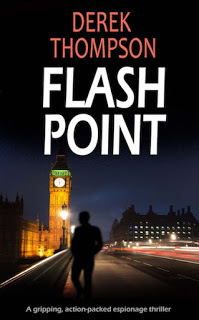 The rules have changed.I’ve made no secret of the fact that Raymond Chandler’s writing is one of the inspirations for my Thomas Bladen spy thrillers, but I also owe a huge debt to cinema. It’s my great pleasure now to introduce you to a back catalogue of films that remain classics of the spy / thriller genre. Many of them are derived from novels but for consistency I will only reference the films and I’ve added the IMDB links so you can read about the plot in more detail. I hope you find some old favourites here, as well as some ‘new’ classics to add to your own list.
The rules have changed.I’ve made no secret of the fact that Raymond Chandler’s writing is one of the inspirations for my Thomas Bladen spy thrillers, but I also owe a huge debt to cinema. It’s my great pleasure now to introduce you to a back catalogue of films that remain classics of the spy / thriller genre. Many of them are derived from novels but for consistency I will only reference the films and I’ve added the IMDB links so you can read about the plot in more detail. I hope you find some old favourites here, as well as some ‘new’ classics to add to your own list.We’ll come back to Raymond Chandler in a bit. First and foremost, I have to pay tribute to The 39 Steps, a tale of a man unwittingly drawn into a murderous conspiracy, who goes on the run to prove his innocence. I favour the 1935 version with Robert Donat and Madeleine Carroll, as well as a brilliant BBC version from 2008 (which includes elements from the novel that were left out of every other film). How much do I love The 39 Steps? Well, in Standpoint, Thomas watches the 1935 version with Miranda and comments on how Hitchcock changed the story from the novel. There’s also a homage to one of the film’s plot devices in Line of Sight, my follow-up to Standpoint. I put North by Northwest (1959) alongside The 39 Steps as another great example of a mistaken identity driving the plot forward. How do you win through when you don’t know what you’re supposed to know? I think it helps to have other people looking out for you from time to time.
The films Farewell My Lovely (1944), The Big Sleep (1946) and The Long Goodbye (1973) allow Raymond Chandler’s world-weary private detective, Philip Marlowe, to fill the screen; much like Bogart’s performance as Sam Spade in the Dashiell Hammett co-scripted adaptation of The Maltese Falcon. My original intention had been to write Thomas Bladen as a detective, only he arrived pretty much fully formed and had his own opinions about what he did for a living. What I love most about this batch of films is the dialogue and the characterisation. The plots are well-crafted but to me they are secondary. The ‘hero’ is flawed and his attitude is often more hindrance than help as he battles relentlessly against the tide. These films are gritty, sometimes sleazy and show the underbelly of society. Yet somehow, almost miraculously, the hero emerges with most of his honour intact. My fondness for this genre led to the creation of Leon Thurston, a West Indian private detective who plies his trade from an old minicab office in Dalston. East London. While we’re on the subject of Chandler, make time for The Blue Dahlia (1947) – it’s an intriguing whodunit that apparently involved a controversial rewritten ending…but you can research that for yourself! Like Alan Ladd’s Johnny Morrison, Thomas Bladen is a little out of steps with the world around him, but the right woman makes all the difference.
Spies yet? Well, almost. Vicious Circle (1957) finds a humble doctor (humble but with a cravat!) drawn into a deadly game of blackmail and intrigue that leads him questioning who is out to get him – and why? I’d put this one in the same category as The Man Who Knew Too Much (1934) and also (1956). Ordinary people in extraordinary times, who dig deep when they find themselves pawns in a much bigger game – much like Robert Hannay in The 39 Steps.
Both The Conversation (1974) and Enemy of the State (1998) tackle surveillance, paranoia and ethics, along with the perennial question of who watches the watchers. It is perennial too, as that phrase is as old as the Romans. In Thomas Bladen’s world, a simple surveillance job often turns out to be far more complicated and it doesn’t pay to ask too many questions (not that it stops him). The observer may seem impartial but they cannot deny there are consequences to their work. Three Days of the Condor (1975) pits one man against the ‘organisation’, by trying to stay one step ahead of everyone, in order to get to the truth and hold people in power accountable. By book five, Flashpoint, Thomas has learned that justice can take many forms and sometimes even a bitter compromise is the best option. The Third Man (1949) involves a mystery, a disappearing act with a difference and a conspiracy – how do you find out the truth when everyone is telling you something different? Its cunning and amoral titular character (compelling played by Orson Welles) dominates the film despite not being the main role. This group of films demonstrate another element that I wanted to bring to my books: unresolved endings. The moviegoer is left wondering what could happen afterwards.
I hope you’ll make time to watch all these films, even if you’ve seen them before.
For those who enjoy extra homework, make time for:
The Long Memory (1953)Rear Window (1954) A Prize of Arms (1962)Gilda (1946)Build My Gallows High (1946)In a Lonely Place (1946)
When not watching classic cinema, I write Thomas Bladen spy thrillers - intrigue, action and sardonic humour.

UK https://www.amazon.co.uk/Derek-Thompson/e/B0034ORY08
US https://www.amazon.com/Derek-Thompson/e/B0034ORY08
FLASHPOINT – Part Five of the Spy Chaser series
After London suffers a coordinated terror attack, Thomas Bladen questions everything – his future with Miranda, his Surveillance Support Unit job and even his clandestine role as a Spy Chaser.
But his troubles are just beginning.
When the Unit comes under MI5’s control and two senior SSU staff disappear, his search for answers is blocked at every turn.
A missing handgun and the reappearance of old adversaries forces him into uneasy alliances and hard choices.
- Could there be a double agent in their latest assignment? - What is behind the rift between government departments? - And what if he has got it wrong this time?
Thomas must face his deepest fears and what he discovers could change the rules forever.
Amazon UK
Amazon US
Published on February 06, 2018 04:30
January 9, 2018
How freelance writers can make a fresh start in January
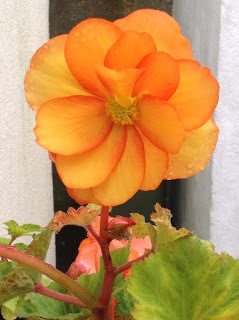 It's time to bloom.We are all driven by deadlines, even if we don't always meet them - Christmas presents bought before the 24th of December (preferably), birthday cards posted to arrive neither too early nor too late, get into work before the boss, and finish that novel in your bottom drawer before you die, to name but a few.
It's time to bloom.We are all driven by deadlines, even if we don't always meet them - Christmas presents bought before the 24th of December (preferably), birthday cards posted to arrive neither too early nor too late, get into work before the boss, and finish that novel in your bottom drawer before you die, to name but a few. Most deadlines are logical although some run contrary to popular opinion, like my local supermarket's decision to start selling Easter eggs on the 7th of January. Good luck with that.
January is that time of the year when we wipe the dust from our gym membership card, swear off biscuits (again) and promise ourselves that this time next year it'll all be different. I can't guarantee that, even for myself, but here are my suggestions for a freelance writer's To Do list in January.
Check your resume and portfolio
1. Make sure all the links still work (websites may not last, or the website gets restructured) - nothing stinks like a dead link. You might want to consider storing your best links online through a site like https://ebyline.com.
2. Review the language and format of your resume. Does it focus on your strengths, convey your awesomeness, position you favourably for your target niches?
3. Are your portfolio examples current and relevant? Does a one-off high value job from long ago help promote your business now?
Manage your money
1. Speaking of deadlines, have you completed your tax return and paid up? If, you'd best get on with it!
2. Do you know which clients are your A listers, and which are, frankly, hard work before you even start writing? Carol Tice recommends periodically culling the lowest paying client and then making sure the next client comes in at a higher rate.
3. When did you last review your rates and is it time to raise them? January is an excellent time to alert clients to a rate rise in the new financial year. It's also a great lead-in to scheduling work before then at the current rate.
4. Do you have a folder of prewritten or second rights' material that never gets an airing? This could be the perfect time to review and repurpose for revenue!
5. Are you on the best deals for a landline phone, broadband, and a mobile phone. Whether you're in contract or not, you could make savings by switching or negotiating a better deal.
Time
1. Make regular time for pitching.
2. Keep set hours and limit distractions.
3. Make time to keep your skills current and to look for new niches. For example, I wrote a piece about keeping chickens that developed into a Green Living column, which in turn helped me get some eco product pieces. All thanks to Sweet Pea and Pepperami.
What do you do in January to make your writing year successful?
Published on January 09, 2018 04:52
December 23, 2017
Pull the Other One - Adventures with Cracker Jokes
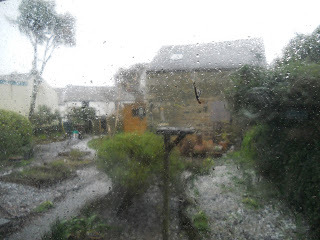 A ghost of Christmas past.This is the second year I've entered the Gold Channel cracker joke competition. The fact that I'm mentioning it at all should alert you to the prospect of a happy or unhappy ending. In this case, both!
A ghost of Christmas past.This is the second year I've entered the Gold Channel cracker joke competition. The fact that I'm mentioning it at all should alert you to the prospect of a happy or unhappy ending. In this case, both!The brief was for something topical and festive, perhaps with a twist on a traditional Christmas cracker groaner. I posted 15 on Twitter and my favourite is neither topical nor festive. Maybe that's why it failed to impress the audience.
Who is Rudolf's favourite singer? Elkie Brooks!
Anyway, one of my little crackers made the cut for the top 20. Sadly for me, only the top ten get a writer's mention and mine came in at number 11.
My winning entry.
 Here are the others:
Here are the others:What do you give the man who has everything for Christmas? Amnesia.
Which Triumph model did Gabriel and Michael prefer? Hark the Herald, angels sing
Which monarch drinks too much at Christmas? Good King Senseless.
How do Royal Mail staff run a strike ballot? First past the post.
What do you get if you use power tools to make the house more festive? Double-decorations.
Where does Father Christmas go to the toilet? In an igloo.
What is the Christmas gift that money can't buy? Money, unless it's foreign currency.
How do Santa's elves decide what to wear? They suit themselves.
Where do armies fear to tread at Christmas? Snowman's Land.
What is Rudolf's favourite dessert? Chocolate moose.
Where does Father Christmas go for his holidays? Easter Island.
Why did the elves give Santa cranberry sauce and mustard? They wanted to pass on the condiments of the season.
What do Santa's midnight feasts and London drivers have in common? They both pay a heavy congestion charge.
What does Father Christmas eat on Boxing Day? Quiche la reindeer.
Merry Christmas, one and all – that’s my festive motto!
Published on December 23, 2017 09:31
December 9, 2017
Today's Subject is Subjectivity
Sir Isaac Newton stated that for every action, there is an equal and opposite reaction. For authors that gets translated into 'for everyone who likes your work, someone else will hate it'. There doesn't have to be any rhyme or reason about it; it's just a thing.
This state of affairs was brought back to me recently when I decided to seek out a publisher for superhero club, my mid-grade children's book about bullying, friendship, self-acceptance and transformation. Originally, it was published by Musa Publishing and when they folded I self-dubbed it to try and get a wider audience. It was also considered for use in a therapeutic / workshop setting for young people who may have experienced one or more of the issues touched upon in the book.
The first publisher I contacted was quite enthusiastic and promised me a response within eight weeks. However, their actual response consisted of 'thanks, but we rarely take on new books right now'. And yes, of course I sent them a query first before submitting the manuscript.
The next publisher felt the book was... 'a little unfocused and didn't necessarily know which age group it was being aimed at. We need to make sure that we're directing the content specifically at a certain age group. Otherwise, the book simply doesn't work.'
Having had it previously published (and edited and focused by Musa), I found this a tad surprising. Not that the other publisher is wrong, from their perspective, just that it differs from Musa's and the readers who were kind enough to leave reviews.
Interestingly, despite having four of my Spy Chaser novels published since 2005 by Joffe Books, the first part of the above feedback that caught my eye was the book simply doesn't work. All of which goes to show that:
1. Opinions vary (informed and otherwise). It's important to really believe in your work, even if other people do not, and use any feedback to improve your manuscript or perhaps your pitch.
2. Having your work published will not change you. Sure, there might be some money in the bank, and yes, you can see your work for sale. But any nagging insecurities will stick around like unwelcome guests unless change your perspective. See item 1 above for details!
3. Sometimes it's time for new stories, not just on the page but also the ones we tell ourselves. Our fixed ideas about what a writer is and is not are, in fact, mere acts of imagination. And if you're going to start imagining, why not imagine some positive things!
4. All writers have to start somewhere and are capable of developing their craft.
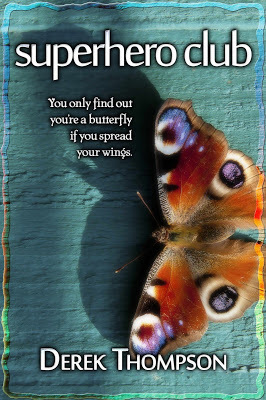
Amazon UK
Amazon US
[image error]
Published on December 09, 2017 12:16
September 5, 2017
Authors & Books - Being Krystyna
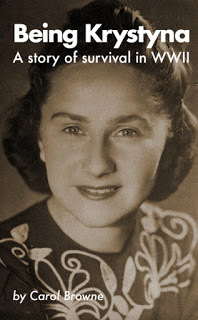
Most authors will tell you that the fictional world of their books comes from a real world inspiration. - a news item, an overheard conversation, or perhaps a personal experience that sparks off a chain of inspiration. There is another purpose of storytelling - to memorialise a true story so that friends, family and future generations can see history through the eyes of those who lived through it (and often those who did not).
I'm grateful to Carol Browne for making time to discuss her work on Being Krystyna - A Story of Survival in WWII.
1. What was it that drew you to the project?
I volunteered to write the life story of local woman Krystyna Porsz after a chance meeting with her son in a Polish restaurant in 2011; but I was a very reluctant biographer. I did it because no-one else could be found who was either able or willing to take it on and that was my only reason. I thought, “If I don’t do it, no-one will.” It seemed far too big a responsibility to me but I told Krystyna’s son I’d give it a go, even though I was convinced I wasn’t up to the job. I write fiction. I make stuff up. I assumed non-fiction would be completely different.
2. Did your approach differ from writing fiction?
I discovered that non-fiction and fiction aren’t so different after all because the author still needs to provide the reader with a compelling read. It can’t be written as a chronological series of events or it will be very dull. In the case of Being Krystyna - A Story of Survival in WWII, although I had the facts of Krystyna’s life, they amounted to a few sheets of A4 paper, hardly enough material for a book. So I had to build a structure to hang those facts on, very much like creating a plot for a work of fiction. A young Polish friend of mine had visited Krystyna on two occasions and I used her as a narrative device, so we see the story unfold through her eyes. This gave me much more opportunity to expand the text while still being true to the available facts. It also added another dimension to the story, comparing the very different life experiences of two Polish women.
Additional challenges, however, present themselves when you remember you are dealing with someone’s actual life. Writers of fiction know that characters are apt to take on a life of their own. They seem real to their creators and as authors we want to portray them in their best light. When you are writing a real person’s story, this becomes vitally important. The sense of responsibility the author feels is magnified. For me, writing about Krystyna, it was off the scale; here was a very old lady whose ability to communicate was seriously hampered by dementia. There wouldn’t be any chance of being able to discuss the book with her. There wouldn’t be any feedback. While I was writing the book, I kept thinking, “If this were my life story, would I be happy with how it’s being handled?” That was my benchmark all the time and I’m confident I kept to it.
3. How did the experience change you?
Writing a real person’s story is a challenge. It’s hard work. But I recommend it, especially if that person’s life is drastically different from your own. It’s an enlightening experience. It will broaden your mind and test your ability as a writer. It will give you the opportunity to write something that really deserves to be written. I only met Krystyna once but I made a point of shaking her hand before I left. I needed to physically touch someone who had survived the Holocaust, who had lived a history I had only read about or seen on black and white newsreels. Krystyna Porsz is a truly brave person. A survivor. I’m grateful not only to have met her, but to have had the honour of telling her story.
4. Where can we find out more about Being Krystyna?
Being Krystyna is available in Kindle format on Amazon.Being Krystyna (UK): http://tinyurl.com/hanoycgBeing Krystyna (US): https://tinyurl.com/ya6gn7c5
You can visit the website of my publisher, Dilliebooks: https://www.dilliebooks.com/ I also write other books and you can find my blog at https://authorcarolbrowne.wordpress.com
Published on September 05, 2017 06:36
Being Krystyna

Most authors will tell you that the fictional world of their books comes from a real world inspiration. - a news item, an overheard conversation, or perhaps a personal experience that sparks off a chain of inspiration. There is another purpose of storytelling - to memorialise a true story so that friends, family and future generations can see history through the eyes of those who lived through it (and often those who did not).
I'm grateful to Carol Browne for making time to discuss her work on Being Krystyna - A Story of Survival in WWII.
1. What was it that drew you to the project?
I volunteered to write the life story of local woman Krystyna Porsz after a chance meeting with her son in a Polish restaurant in 2011; but I was a very reluctant biographer. I did it because no-one else could be found who was either able or willing to take it on and that was my only reason. I thought, “If I don’t do it, no-one will.” It seemed far too big a responsibility to me but I told Krystyna’s son I’d give it a go, even though I was convinced I wasn’t up to the job. I write fiction. I make stuff up. I assumed non-fiction would be completely different.
2. Did your approach differ from writing fiction?
I discovered that non-fiction and fiction aren’t so different after all because the author still needs to provide the reader with a compelling read. It can’t be written as a chronological series of events or it will be very dull. In the case of Being Krystyna - A Story of Survival in WWII, although I had the facts of Krystyna’s life, they amounted to a few sheets of A4 paper, hardly enough material for a book. So I had to build a structure to hang those facts on, very much like creating a plot for a work of fiction. A young Polish friend of mine had visited Krystyna on two occasions and I used her as a narrative device, so we see the story unfold through her eyes. This gave me much more opportunity to expand the text while still being true to the available facts. It also added another dimension to the story, comparing the very different life experiences of two Polish women.
Additional challenges, however, present themselves when you remember you are dealing with someone’s actual life. Writers of fiction know that characters are apt to take on a life of their own. They seem real to their creators and as authors we want to portray them in their best light. When you are writing a real person’s story, this becomes vitally important. The sense of responsibility the author feels is magnified. For me, writing about Krystyna, it was off the scale; here was a very old lady whose ability to communicate was seriously hampered by dementia. There wouldn’t be any chance of being able to discuss the book with her. There wouldn’t be any feedback. While I was writing the book, I kept thinking, “If this were my life story, would I be happy with how it’s being handled?” That was my benchmark all the time and I’m confident I kept to it.
3. How did the experience change you?
Writing a real person’s story is a challenge. It’s hard work. But I recommend it, especially if that person’s life is drastically different from your own. It’s an enlightening experience. It will broaden your mind and test your ability as a writer. It will give you the opportunity to write something that really deserves to be written. I only met Krystyna once but I made a point of shaking her hand before I left. I needed to physically touch someone who had survived the Holocaust, who had lived a history I had only read about or seen on black and white newsreels. Krystyna Porsz is a truly brave person. A survivor. I’m grateful not only to have met her, but to have had the honour of telling her story.
4. Where can we find out more about Being Krystyna?
Being Krystyna is available in Kindle format on Amazon.Being Krystyna (UK): http://tinyurl.com/hanoycgBeing Krystyna (US): https://tinyurl.com/ya6gn7c5
You can visit the website of my publisher, Dilliebooks: https://www.dilliebooks.com/ I also write other books and you can find my blog at https://authorcarolbrowne.wordpress.com
Published on September 05, 2017 06:36
August 12, 2017
This Old Thing - why writers shouldn't hide their light
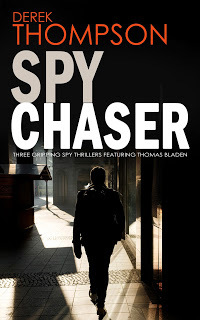 I'm fortunate to know many writers, each at different stages of their craft, and I've yet to find one who really celebrates their talent. True, there is the social media 'woot' when a chapter is completed or a word count is reached, but ask them to take a bow and you can practically hear footsteps receding into the distance.
I'm fortunate to know many writers, each at different stages of their craft, and I've yet to find one who really celebrates their talent. True, there is the social media 'woot' when a chapter is completed or a word count is reached, but ask them to take a bow and you can practically hear footsteps receding into the distance. I think our US cousins have a more expensive approach to their moment in the spotlight, although even there I've seen proud pen smiths become shrinking violets. So this is pep talk for all writers, only with a difference. I'd like to remind them - and readers - about the perils, pitfalls, and dark clouds we weather as part of our literary obsession.
1. Writing is an amazing, imaginative and, on occasions, transformative process, but it is not without its shadow side. Despite the tropes of a four-hour typing flourish with words streaming perfectly on to the page, entire and cohesive book plots arriving in your consciousness like the morning post, and characters introducing themselves fully formed with back story (although this one has happened to me a few times), the elephant in the writing room is that it’s bloody hard work.
2. Maybe it’s changed now but when I was at school, creative writing was simply about telling a story and playing with ideas. Nuance, style and technique were prizes of serendipity and not hard-won achievements. Now, when you write to be read you can’t help but be aware that someone will (hopefully) sit down with your book and a cup of tea (other beverages are available), eager to get their entertainment quotient for the cover price. When you disappoint them you also feel that you've disappointed yourself and your craft. (Sometimes you can also hear the muse crying or ranting in a corner!)
3. The creative process is a solitary one and it has to be. You can’t enter fully into your own inner world if you’re still being pulled by the outer one. To misquote from my yet-to-be-contracted US novel, it’s a little like building castles in the air and then choosing the furniture.
4. Once you have written your book and gone through the seven levels of hell that are editing, deciding along the way that you love / hate / love / hate / are indifferent to your opus, you then put your baby on the stage and start contacting agents and publishers or prepare for self-publication (where you are responsible for everything). If you are successful you will attract the praise, wonder and ire of your peers - most of whom you’re never likely to meet except online. But hey, you’ve climbed a rung and those who have not are entitled to their own take on the situation. Well, as long as your editor or agent isn’t a family friend or a member of your family. That state of affairs is never going to win you friends and will dog you like a bad smell – irrespective of the actual artistic merit of your book. There is no entitlement in writing, but heaven help any writer who appears to have been given a side door into the magical world of publishing!
5. Let’s move the calendar forward. You are officially a published writer. Now you can call yourself an author and everyone will want to know what you write (insert genre prejudices here!), who is publishing you (and who has heard of them), whether it’s going to be out in paperback or ebook (e-sniffiness is an allergy affecting many writers), and the $64,000 question – will you be receiving $64,000? The question is a strange one since, in my limited experience, no answer is a happy one. Explaining that there was no advance will earn you the pitying look one gives an old Labrador Retriever that’s in its dotage, while a modest advance merits a nod of condolence. A large advance, meanwhile, earns you an enthusiastic response that translates as ‘you lucky (and probably undeserving) bastard’.
6. The calendar skips along and your book is out there for all the world to see. Your greatest challenges are now, in no particular order:
a) Promoting your book without abusing the hospitality of your fellow writers, sounding like a cracked record, and spending so long on social media that you stop doing any further writing.
b) Not checking for book reviews like an addict.
c) Finding new angles to promote your work.
d) Not oversharing your happiness about your success, or – worse in my opinion – underplaying your success. I’ve seen it several times where writers have really gone through the mill and put their lives on hold to finish a book and then take on an attitude of ‘what, this old thing – it’s just a story really’. No. Bad writer. You jolly well stand there and take the credit for your efforts.
To do otherwise is disingenuous at best and self-sabotage at worst. And it absolutely won’t help you sell books, which is part and parcel of your role as an author.
7. As bright at your star is, and as well received as your book will hopefully be, you will meet critics along the way. Some will have valid observations, some will have chosen your book unwisely, some will feel their expectations have not been met, and some…well…some people enjoy finding fault.
Your star will usually fade – I won’t say inevitably as some authors buck the trend. Often though, sales decrease, other writers come along to steal your thunder and friends of yours who were behind you on the trail catch up and may surpass you. Celebrate their success with them and give them all the support you can because you know, from experience, the rocky path they’ve travelled.
Derek
Amazon UK https://www.amazon.co.uk/Derek-Thompson/e/B0034ORY08
Amazon UK https://www.amazon.com/Derek-Thompson/e/B0034ORY08
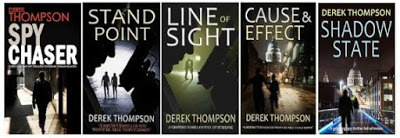
Published on August 12, 2017 08:41
August 6, 2017
To write or not to write?
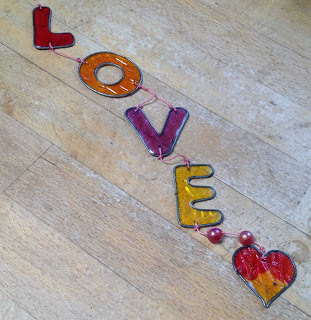 The hidden ingredient in every piece of writing.Ask most writers, whether they are starting out, seasoned, or overcooked, and they all tell you the same thing - they write because it's a compulsion. It's the nagging internal voice when you read someone else's below par writing that whispers, "You could do better than this." It's that same voice when you're amongst other people that nudges you and mutters, "Write that line down." It's also the barely heard wraith of a voice through the fog of your self-doubt that reminds you to keep going.
The hidden ingredient in every piece of writing.Ask most writers, whether they are starting out, seasoned, or overcooked, and they all tell you the same thing - they write because it's a compulsion. It's the nagging internal voice when you read someone else's below par writing that whispers, "You could do better than this." It's that same voice when you're amongst other people that nudges you and mutters, "Write that line down." It's also the barely heard wraith of a voice through the fog of your self-doubt that reminds you to keep going.It can be so, so easy to fall out of love with writing. There are more challenges thrown at you than Romeo and Juliet had to contend with. They could have simply eloped, although it would have made for a much shorter play.
Reasons to doubt yourself as a writer:
1. The first draft is awful. On a par with a two-month old piece of cheese left at the back of the fridge.
2. Unlike a rather lovely 1945 film, you frequently have no idea where you're going. And sometimes you'll need to turn back or head off through the thicket.
3. Countless writers do it better than you and are doing better than you. And you can read about them online, in newspapers or in bookshops.
4. It can be a hard slog to grab the attention of an agent or a publisher, and even then there is no guarantee of a contract. And even a contract is no guarantee of sales.
5. Everyone is a critic, and those who are the most critical are not shy about it. They will vilify your paper / electronic children and in so doing humiliate you. They will insist that they have 'found you out' and unmasked you as a pretend writer. In fact, they are often so busy doing this that they have no time to write their own masterpieces. Now that's what I call sacrifice and public service.
6. Talent, plaudits and sales are not the same thing. Let's not forget that even Jane Austen was a slow burner.
7. You rarely feel your final version is the final version. However, over-edit at your peril.
Reasons to stick with it:
1. You have absolute freedom to write absolutely anything. How brilliant is that?!
2. You and your writing develop simultaneously. The more you understand about yourself and life, the more you can pour that into your writing. Conversely, reading other people's work and examining your own creative process can enrich your life. [The one non-writers jokingly refer to as 'the real world' (whatever that is).]
3. Sometimes, when you write there can be moments of magic - unexpected insights, characters talking back to you and guiding the pen, or the threads of a book converging like the final note in The Beatles' A Day in the Life. Who wouldn't welcome a little magic into their lives?
4. You could finish a book. A book. By you. That book can then be read by other people, giving them a visitor's ticket to your inner world.
5. You can connect with a worldwide community of writers who understand your challenges on the page and can sometimes help you through them.
6. Your writing can lead you to interesting and unimaginable places. Not just publication, but opportunities you've never even dreamed of. I wrote 100 funny slogans about socks, co-wrote a magazine for a while, and also scripted a short comedy film script because I stuck with writing and gained the confidence to put myself out there.
7. Your stories are unique to you. An individual perspective that no one else can replicate. Think about that. Little me or little you, staring at our screens and creating something from our own experience and imaginings. Giving form to ideas and emotions that the people can then experience for themselves.
Now, what are you waiting for?
Derek
My books live here. Not everyone likes them and that's okay too!
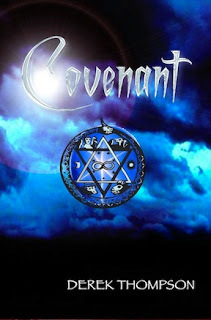
Published on August 06, 2017 04:51



